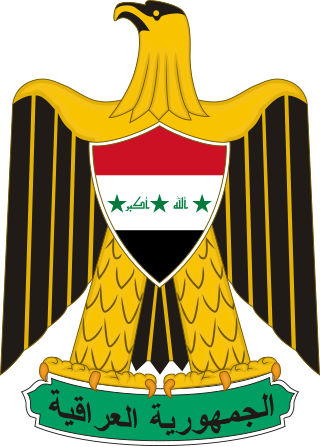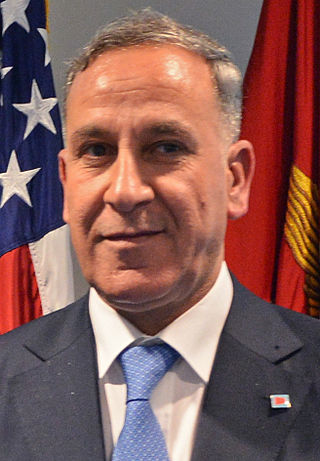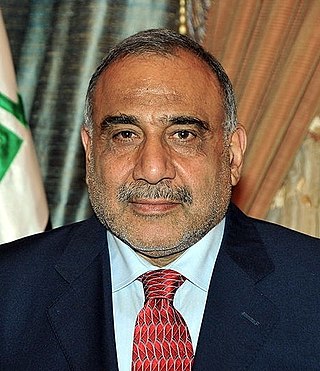Related Research Articles
Iraq is a federal parliamentary representative democratic republic. It is a multi-party system whereby the executive power is exercised by the Prime Minister of the Council of Ministers as the head of government, the President of Iraq as the head of state, and legislative power is vested in the Council of Representatives.

The prime minister of the Republic of Iraq is the head of government of Iraq and the commander-in-chief of the Iraqi Armed Forces. On 27 October 2022, Mohammed Shia' Al Sudani became the incumbent prime minister.

Ibrahim Abdul Karim al-Eshaiker, better known as Ibrahim al-Jaafari, is an Iraqi politician who was Prime Minister of Iraq in the Iraqi Transitional Government from 2005 to 2006, following the January 2005 election. He served as Minister of Foreign Affairs from 2014 to 2018.

Muqtada al-Sadr is an Iraqi Shia Muslim cleric, politician and militia leader. He inherited the leadership of the Sadrist Movement from his father. He founded the now dissolved Mahdi Army militia in 2003 that resisted the American occupation of Iraq. He also founded the Promised Day Brigade militia after the dissolution of the Mahdi Army; both were backed by Iran. In 2014, he founded the Peace Companies militia and is its current head. In 2018, he joined his Sadrist political party to the Saairun alliance, which won the highest number of seats in the 2018 and 2021 Iraqi parliamentary elections.

After the 2003 invasion of Iraq, evidence began to emerge of failed attempts by the Iraqi government to bring the conflict to a peaceful resolution.

The Iraqi Interim Government was created by the United States and its coalition allies as a caretaker government to govern Iraq until the drafting of the new constitution following the National Assembly election conducted on January 30, 2005. The Iraqi Interim Government itself took the place of the Coalition Provisional Authority on June 28, 2004, and was replaced by the Iraqi Transitional Government on May 3, 2005.

Barham Salih is an Iraqi Kurdish politician who served as the eighth president of Iraq from 2018 to 2022.

Adil Abdul-Mahdi al-Muntafiki is an Iraqi politician who served as Prime Minister of Iraq from October 2018 until May 2020. Abdul-Mahdi is an economist and was one of the vice presidents of Iraq from 2005 to 2011. He formerly served as Minister of Finance in the Interim government and Oil Minister from 2014 to 2016.
Harith Mohey Al Deen Abd al-Obeidi was an Iraqi politician and cleric and member of Parliament for the Iraqi Accord Front. He was assassinated on 12 June 2009.
This article concerns the formation process of the Al Maliki I Government of Iraq in the aftermath of the Iraq National Assembly being elected on December 15, 2005. Due to disputes over alleged vote-rigging the results of the election were only certified by the Independent Electoral Commission of Iraq on February 10, 2006.

Mohammed Shia' Al Sudani is an Iraqi politician who has been the Prime Minister of Iraq since 27 October 2022. Prior to his premiership, he held a number of ministerial positions; namely, Minister of Industry and Minerals, Minister of Labour and Social Affairs, acting Minister of Trade, acting Minister of Finance, acting Minister of Migration and Displacement, acting Minister of Agriculture, and Minister of Human Rights. He was Governor of Maysan in 2009-2010.

The departure of US troops from Iraq in 2011 ended the period of occupation that had begun with the U.S.-led invasion in March 2003. The time since U.S. withdrawal has been marked by a renewed Iraqi insurgency and by a spillover of the Syrian civil war into Iraq. By 2013, the insurgency escalated into a renewed war, the central government of Iraq being opposed by ISIL and various factions, primarily radical Sunni forces during the early phase of the conflict. The war ended in 2017 with an Iraqi government and allied victory, however ISIL continues a low-intensity insurgency in remote parts of the country.

Khaled Yassin al-Obaidi is an Iraqi politician who served as the defense minister of Iraq from 2014 to 2016.

The Abdul Mahdi government was the government of Iraq, headed by Prime Minister Adil Abdul-Mahdi. It was approved by the Council of Representatives on 24 October 2018 and followed a general election in May 2018. The United Nations described the formation as an "exemplary peaceful transfer of power".

Fuad Mohammed Hussein is an Iraqi Kurdish politician from the Kurdistan Democratic Party who is the current Iraqi Minister of Foreign Affairs. He was previously the Minister of Finance in the Government of Adil Abdul-Mahdi.
Bangen Abdullah Rekani is an Iraqi politician from the Kurdistan Democratic Party. He is the Minister of Construction, Housing, Municipalities, and Public works since 2018. He had previously served as Minister of Justice in the Government of Adil Abdul-Mahdi.
Jamal Abbas al-Adli is an Iraqi independent politician who is the current Water Resources Minister in the Government of Adil Abdul-Mahdi.

As sequel to protests in 2011, 2012 and 2013, Iraqi citizens have also in 2015 up until 2018 often and massively protested against the corruption and incompetence in their government which according to analysts and protesters had led to long-running problems in electricity supplies, clean water availability, Iranian interference in Iraqi politics, high unemployment, and a stagnant economy.

Najah Hassan Ali al-Shammari is an Iraqi politician and military officer who served as the Minister of Defense from June 2019 to May 2020. He holds Swedish citizenship.

A series of demonstrations, marches, sit-ins and civil disobedience took place in Iraq from 2019 until 2021. It started on 1 October 2019, a date which was set by civil activists on social media, spreading mainly over the central and southern provinces of Iraq, to protest corruption, high unemployment, political sectarianism, inefficient public services and foreign interventionism. Protests spread quickly, coordinated over social media, to other provinces in Iraq. As the intensity of the demonstrations peaked in late October, protesters' anger focused not only on the desire for a complete overhaul of the Iraqi government but also on driving out Iranian influence, including Iranian-aligned Shia militias. The government, with the help of Iranian-backed militias responded brutally using live bullets, marksmen, hot water, hot pepper gas and tear gas against protesters, leading to many deaths and injuries.
References
- 1 2 "ISHM: October 19 - 25, 2018 - Iraq". ReliefWeb. Retrieved 2018-10-27.
- ↑ "House of Representatives gives confidence to Abdul Mahdi and 14 ministers". Al Forat News via dinardetectives.com. 2018-10-24. Retrieved 2018-10-29.
- ↑ "New Youth Minister Obeidi was ISIS leader: Zobaie". Baghdad Post. 2018-11-08. Retrieved 2018-11-09.
- ↑ "Two Iraq ministers risk sack over Saddam-era posts". Arab News. 2018-11-08. Retrieved 2018-11-09.
- ↑ Kurdistan24. "Iraqi parl. to dismiss two new ministers, amid alleged ties to former regime, al-Qaeda". Kurdistan24. Retrieved 2018-11-09.
{{cite news}}: CS1 maint: numeric names: authors list (link)